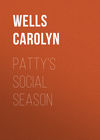Читать книгу: «Raspberry Jam», страница 5
Chapter VI
A Slammed Door
“Don’t you call her ‘that Desternay woman’!”
“I’ll call her what I please! And without asking your permission, either. And I won’t have my wife playing bridge at what is practically a gambling house!”
“Nothing of the sort! A party of invited guests, in a private house is a social affair, and you shall not call it ridiculous names! You play for far higher stakes at your club than we ever do at Fifi Desternay’s.”
“That name is enough! Fancy your associating with a woman who calls herself Fifi!”
“She can’t help her name! It was probably wished on her by her parents in baptism—”
“It probably was not! She was probably christened Mary Jane!”
“You seem to know a lot about her.”
“I know all I want to; and you have reached the end of your acquaintance with her and her set. You are not to go there, Eunice, and that’s all there is about it.”
The Emburys were in Eunice’s bedroom. Sanford was in evening dress and was about to leave for his club. Eunice, who had dined in a negligée, was donning an elaborate evening costume. She had dismissed her maid when Embury came into the room, and was herself adjusting the finishing touches. Her gown of henna-colored chiffon, with touches of gold embroidery, was most becoming to her dark beauty, and some fine ornaments of ancient carved gold gave an Oriental touch to her appearance. She stood before a long mirror, noting the details of her gown, and showed an irritating lack of attention to Embury’s last dictum.
“You heard me, Eunice?” he said, caustically, his hand on the doorknob.
“Not being deaf, I did,” she returned, without looking toward him.
“And you will obey me?” He turned back, and reaching her side, he grasped her arm with no uncertain touch. “I demand your obedience!”
“Demands are not always granted!”
She gave him a dazzling smile, but it was defiant rather than friendly.
“I make it a request, then. Will you grant me that?”
“Why should I grant your requests, when you won’t grant mine?”
“Good Lord, Eunice, are you going to harp on that allowance string again?”
“I am. Why shouldn’t I, when it warps my whole life—”
“Oh, come, cut out the hifalutin’ talk!”
“Well, then, to come down to plain facts, there isn’t a day that I’m not humiliated and embarrassed by the lack of a little cash.”
“Bad as that?”
“Yes, quite as bad as that! Why, the day we went out to Newark I didn’t have five cents to buy Aunt Abby a newspaper, and she had to get along without one!”
“She seemed to live through it.”
“Sanford, you’re unbearable! And to-day, at Mrs. Garland’s, a woman talked, and then they took up a collection for the ‘Belgian Home Fires,’ and I didn’t have a cent to contribute.”
“Who is she? I’ll send a check.”
“A check! You answer everything by a check! Can’t you understand? Oh, there’s no use explaining; you’re determined you won’t understand! So, let us drop the subject. Is to-night the club election?”
“No, to-morrow night. But to-night will probably decide it in my mind. It practically hinges on the Meredith set—if they can be talked over—”
“Oh, Sanford, I do hope they can!” Eunice’s eyes sparkled and she smiled as she put her hands on her husband’s shoulders. “And, listen, dear, if they are—if you do win the election, won’t you—oh, San, won’t you give me an allowance?”
“Eunice, you’re enough to drive a man crazy! Will you let up on that everlasting whine? No, I won’t! Is that plain?”
“Then I shall go and get it for myself!”
“Go to the devil for all I care!”
Sanford flung out of the room, banging the door behind him. Eunice heard him speaking to Ferdinand, rather shortly, and as he left the apartment, she knew that he had gone to the club in their motor car, and if she went out, she would have to call a cab.
She began to take off her gown, half deciding to stay at home. She had never run counter to Embury’s expressed orders and she hesitated to do so now.
And yet—the question of money, so summarily dismissed by her husband, was a very real trouble to her. In her social position, she actually needed ready cash frequently, and she had determined to get it. Her last hope of Sanford failed her, when he refused to grant her wish as a sort of celebration of his election, and she persuaded herself that it was her right to get some money somehow.
Her proposed method was by no means a certain one, for it was the hazardous plan of winning at bridge.
Although a first-rate player, Eunice often had streaks of bad luck, and, too, inexpert partners were a dangerous factor. But, though she sometimes said that winnings and losings came out about even in the long run, she had found by keeping careful account, her skill made it probable for her to win more than she lost, and this reasoning prompted her to risk high stakes in hope of winning something worth-while.
Fifi Desternay was a recent acquaintance of hers, and not a member of the set Eunice looked upon as her own. But the gatherings at the Desternay house were gay and pleasant, a bit Bohemian, yet exclusive too, and Eunice had already spent several enjoyable afternoons there.
She had never been in the evening, for Embury wouldn’t go, and had refused to let her go without him. Nor did she want to, for it was not Eunice’s way to go out alone at night.
But she was desperate and, moreover, she was exceedingly angry. Sanford was unjust and unkind. Also, he had been cross and ugly, and had left her in anger, a thing that had never happened before.
And she wanted some money at once. A sale of laces was to be held next day at a friend’s home, and she wanted to go there, properly prepared to purchase some bits if she chose to.
Her cheeks flushed as she remembered Mason Elliott’s offer to give or lend her money, but she smiled gently, as she remembered the true friendliness of the man, and his high-mindedness, which took all sting from his offer.
As she brooded, her anger became more fierce, and finally, with a toss of her head, she rose from the chair, rang for the maid, and proceeded to finish her toilette.
“Lend me some money, will you, Aunt Abby?” she asked, as, all ready to go, she stepped into the livingroom.
She had no hesitancy in making this appeal. If she won, she would repay on her return. If she lost, Aunt Abby was a good-natured waiter, and she knew Eunice would pay later.
“Bridge?” said the old lady, smiling at the lovely picture Eunice made, in her low gown and her billowy satin wrap. “I thought Sanford took the car.”
“He did. I’m going in a taxi. What a duck you are to let me have this,” as she spoke she stuffed the bills in her soft gold mesh-bag. “Don’t sit up, dear, I’ll be out till all hours.”
“Where are you going?”
“To the end of the rainbow—where there’s a pot of gold! You read your spook books, and then go to bed and dream of ghosts and specters!”
Eunice kissed her lightly, and gathering up her floating draperies, went out of the room with the faithful and efficient Ferdinand.
On his way to the club, Embury pursued that pleasing occupation known as nursing his wrath. He was sorry he had left Eunice in anger—he realized it was the first time that had ever happened—and he was tempted to go back, or, at least to telephone back, that he was sorry. But that would do little good, he knew, unless he also said he was willing to accede to her request for an allowance, and that he was as sternly set against as ever.
He couldn’t quite have told himself why he was so positive in this matter, but it was largely owing to an instinctive sense of the fitness of having a wife dependent on her husband for all things. Moreover, it seemed to him that unlimited charge accounts betokened a greater generosity than an allowance, and he felt an aggrieved irritation at Eunice’s seeming ingratitude.
The matter of her wanting “chicken-feed” now and then seemed to him too petty to be worthy of serious consideration. He really believed that he gave her money whenever she asked for it, and was all unaware how hard he made it for her to ask.
The more he thought about it, the more he saw Eunice in the wrong, and himself an injured, unappreciated benefactor.
He adored his wife, but this peculiarity of hers must be put an end to somehow. Her temper, too, was becoming worse instead of better; her outbreaks were more frequent, more furious, and he had less power to quell them than formerly.
Clearly, he concluded, Eunice must be taught a lesson, and this occasion must be made a test case. He had left her angrily, and it might turn out that it was the best thing he could have done. Poor girl, she doubtless was sorry enough by now; crying, probably. His heart softened as he conjured up the picture of his wife alone, and in tears, but he reasoned that it would do her good, and he would give her a new jewel to make up for it, after the trouble was all over.
So he went on to the club, and dove into the great business of the last possible chance of electioneering.
Though friendly through all this campaign, the strain was beginning to tell on the two candidates, and both Embury and Hendricks found it a little difficult to keep up their good feeling.
“But,” they both reasoned, “as soon as the election is over, we’ll be all right again. We’re both too good sports to hold rancor, or to feel any jealousy.”
And this was true. Men of the world, men of well-balanced minds, clever, logical and just, they were fighting hard, each for his own side, but once the matter was decided, they would be again the same old friends.
However, Embury was just as well pleased to learn that Hendricks was out of town. He had gone to Boston on an important business matter, and though it was not so stated, Embury was pretty sure that the important business was closely connected with the coming election.
In his own endeavor to secure votes, Embury was not above playing the, to him, unusual game of being all things to all men.
And this brought him into cordial conversation with one of the younger club members, who was of the type he generally went out of his way to avoid.
“Try to put yourself in our place, Mr. Embury,” the cub was saying. “We want this club to be up-to-date and beyond. Conservatism is all very well, and we all practiced it ‘for the duration,’ but now the war’s over, let’s have some fun, say we!”
“I know, Billy, but there is a certain standard to be maintained—”
“We, the people of the United States—and tiddle tya—tya—tya! Why, everybody’s doing it! The women—bless ‘em!—too. I just left your wife at a table with my wife, and the pile of chips between ‘em would make some men’s card-rooms hide their diminished walls!”
“That so? You saw my wife this evening? Where?”
“As if you didn’t know! But, good heavens! perhaps you didn’t! Have I been indiscreet?”
“Not at all. At Mrs. Desternay’s, wasn’t it?”
“Yes, but you gave me a jolt. I was afraid I’d peached.”
“Not at all. They’re friends.”
“Well, between you and me, they oughtn’t to be. I let Gladys go, under protest—I left her there myself—but it’s never again for her! I shall tell her so to-night.”
Embury changed the subject and by using all his self-control gave no hint of his wrath. So Eunice had gone after all! After his expressly forbidding it! It was almost unbelievable!
And within an hour of his receiving information, Sanford Embury, in his own car, stopped at the Desternay house.
Smiling and debonair as he entered the drawingroom, he greeted the hostess and asked for his wife.
“Oh, don’t disturb her, dear Mr. Embury,” begged the vivacious Fifi; “she’s out for blood! She’s in the den, with three of our wizards and the sky’s their limit!”
“Tut, tut! What naughtiness!” Embury’s manner was just the right degree of playful reproach, and his fine poise and distinguished air attracted attention from many of the players.
The rooms were filled, without being crowded, and a swift mental stock-taking of the appointments and atmosphere convinced the newcomer that his preconception of the place was about right.
“I must take her away before she cleans out the bunch,” he laughed, and made progress toward the ‘den.’
“Here you are,” he said lightly, as he came upon Eunice, with another woman and two men, all of whom were silently concentrating on what was quite evidently a stiff game.
“Yes, here I am,” she returned; “don’t speak please, until I finish this hand.”
Eunice was playing the hand, and though her face paled, and a spot of bright color appeared on either cheek she did not lose her head, and carried the hand through to a successful conclusion.
“Game and rubber!” she cried, triumphantly, and the vanquished pair nodded regretfully.
“And the last game, please, for my wife,” Embury said, in calm, courteous tones. “You can get a substitute, of course. Come, Eunice!”
There was something icy in his tones that made Eunice shiver, though it was not noticeable to strangers, and she rose, smiling, with a few gay words of apology.
“Perfectly awful of me to leave, when I’m winning,” she said, “but there are times, you know, when one remembers the ‘obey’ plank in the matrimonial platform! Dear Fifi, forgive me—”
She moved about gracefully, saying a word or two of farewell, and then disappeared to get her wrap, with as little disturbance as possible of the other players.
“You naughty man!” and Mrs. Desternay shook her finger at Embury; “if you weren’t so good-looking I should put you in my black books!”
“That would at least keep me in your memory,” he returned, but his smile was now quite evidently a forced one.
And his words of farewell were few, as he led Eunice from the house and down to the car.
He handed her in, and then sat beside her, as the chauffeur turned homeward.
Not a word was spoken by either of them during the whole ride.
Several times Eunice decided to break the silence, but concluded not to. She was both angry and frightened, but the anger predominated.
Embury sat motionless, his face pale and stern, and when they arrived at their own house, he assisted her from the car, quite as usual, dismissed the chauffeur, with a word of orders for the next day, and then the pair went into the house.
Ferdinand met them at their door, and performed his efficient and accustomed services.
And then, after a glance at her husband, Eunice went into her own room and closed the door.
Embury smoked a cigarette or two, and at last went to his room.
Ferdinand attended him, and the concerned expression on the old servant’s face showed, though he tried to repress it, an anxiety as to the very evident trouble that was brewing.
But he made no intrusive remark or implication, though a furtive glance at his master betokened a resentment of his treatment of Eunice, the idol of Ferdinand’s heart.
Dismissed, he left Embury’s room, and closed the door softly behind him.
The door between the rooms of Embury and his wife stood a little ajar, and as his hand fell on it to shut it, he heard a stifled gasp of “Sanford!”
He looked in, and saw Eunice, in a very white heat of rage. In all their married life he had never seen her so terribly angry as she looked then. Speechless from very fury, she stood, with clenched hands, trying to command her voice.
She looked wonderfully beautiful like some statue of an avenging angel—he almost fancied he could see a flaming sword!
As he looked, she took a step toward him, her eyes burning with a glance of hate. Judith might have looked so, or Jael. Not exactly frightened, but alarmed, lest she might fly into a passion of rage that would really injure her, Embury closed the door, practically in her very face. Indeed, practically, he slammed it, with all the audible implication of which a slammed door is capable.
The next morning Ferdinand waited for the usual summons from Embury’s bedroom. The tea tray was ready, the toast crisp and hot, but the summons of the bell was unusually delayed.
When the clock pointed to fifteen minutes past the hour Ferdinand tapped on Embury’s door. A few moments later he tapped again, rapping louder.
Several such attempts brought no response, and the valet tried the door. It would not open, so Ferdinand went to Eunice’s door and knocked there.
Jumping from her bed, and throwing a kimono round her, Eunice opened her own door.
Ferdinand started at sight of her white face, but recovered himself, and said, “Mr. Embury, ma’am. He doesn’t answer my knock. Can he be ill?”
“Oh, I guess not,” Eunice tried to speak casually, but miserably failed. “Go through that way.” She pointed to the door between her room and her husband’s.
Ferdinand hesitated. “You open it, Mrs. Embury, please,” he said, and his voice shook.
“Why, Ferdinand, what do you mean? Open that door!”
“Yes, ma’am,” and turning the knob, Ferdinand entered.
“Why, he’s still asleep!” he exclaimed. “Shall I wake him?”
“Yes—that is—yes, of course! Wake him up, Ferdinand.”
The door on the other side of Eunice’s room opened, and Aunt Abby put her head in.
“What’s the matter? What’s Ferdinand doing in your room, Eunice? Are you ill?”
“No, Aunt Abby—” but Eunice got no further. She sank back on her bed, and buried her face in the pillows.
“Get up, Mr. Embury—it’s late,” Ferdinand was saying, and then he lightly touched the arm of his master.
“He—he—oh, Miss Eunice! Oh, my God! Why, ma’am—he—he looks to be dead!”
With a shriek, Eunice raised her head a moment and then flung it down on the pillows again, crying, “I don’t believe it! You don’t know what you’re saying! It can’t be so!”
“Yes, I do, ma’am—he’s—why, he’s cold!”
“Let me come in!” ordered Aunt Abby, as Ferdinand tried to bar her entrance; “let me see, I tell you! Yes, he is dead! Oh, Eunice—now, Ferdinand, don’t lose your head! Go quickly and telephone for Doctor—what’s his name? I mean the one in this building—on the ground floor—Harper—that’s it—Doctor Harper. Go, man, go!”
Ferdinand went, and Aunt Abby leaned over the silent figure.
“What do you suppose ailed him, Eunice? He was perfectly well, when he went to bed, wasn’t he?”
“Yes,” came a muffled reply.
“Get up, Eunice; get up, dear. That doctor will be here in a minute. Brush up your hair, and fasten your kimono. You won’t have time to dress. I must put on a cap.”
Aunt Abby flew to her bedroom, and returned quickly, wearing a lace cap Eunice had given her, and talking as she adjusted it.
“It must be a stroke—and yet, people don’t have strokes at his age. It can’t be apoplexy—he isn’t that build—and, too, he’s such an athlete; there’s nothing the matter with him. It can’t be—oh, mercy gracious! it can’t be—Eunice! Sanford wouldn’t kill himself, would he?”
“No! no! of course not!”
“Not just now before the election—no, of course he wouldn’t! But it can’t be—oh, Lord, what can it be?”
Chapter VII
A Vision
“I have never been so mystified in all my life!” Dr. Harper spoke in a perplexed, worried way, and a puzzled frown drew his shaggy eyebrows together. Though the family physician of most of the tenants of the large, up-to-date apartment house, he was of the old school type and had the kindly, sociable ways of a smalltown practitioner.
“I know Sanford Embury, bone, blood and muscle,” he said; “I’ve not only been his physician for two years, but I’ve examined him, watched him and kept him in pink of condition for his athletic work. If I hadn’t looked after him, he might have overdone his athletics—but he didn’t—he used judgment, and was more than willing to follow my advice. Result—he was in the most perfect possible physical shape in every particular! He could no more have had a stroke of apoplexy or paralysis than a young oak tree could! And there’s no indication of such a thing, either. A man can’t die of a stroke of any sort without showing certain symptoms. None of these are present—there’s nothing present to hint the cause of his death. There’s no cut, scratch or mark of any description; there’s no suggestion of strangulation or heart failure—well, it’s the strangest thing I ever ran up against in all my years of practice!”
The doctor sat at the Embury breakfast table, heartily partaking of the dishes Ferdinand offered. He had prescribed aromatic ammonia for Eunice, and a cup of coffee for Miss Ames, and then he had made a careful examination of Sanford Embury’s mortal body.
Upon its conclusion he had insisted that the ladies join him at breakfast and he saw to it that they made more than a pretense of eating.
“You’ve a hard day ahead of you,” he said, in his gentle, paternal way, “and you must be fortified as far as possible. I may seem harsh, Mrs. Embury, but I’m going to ask you to be as brave as you can, right now—at first—as I may say—and then, indulge in the luxury of tears later on. This sounds brutal, I daresay, but I’ve a reason, dear madam. There’s a mystery here. I don’t go so far as to say there’s anything wrong—but there’s a very mysterious death to be looked into, and as your physician and your friend, I want to advise—to urge you to keep up your strength for what may be a trying ordeal. In the first place, I apprehend an autopsy will be advisable, and I trust you will give your consent to that.”
“Oh, no!” cried Eunice, her face drawn with dismay, “not that!”
“Now, now, be reasonable, Mrs. Embury. I know you dislike the idea—most people do—but I think I shall have to insist upon it.”
“But you can’t do it, unless I agree, can you?” and Eunice looked at him sharply.
“No—but I’m sure you will agree.”
“I won’t! I never will! You shan’t touch Sanford! I won’t allow it.”
“She’s right!” declared Aunt Abby. “I can’t see, doctor, why it is necessary to have a postmortem. I don’t approve of such things. Surely you can, somehow discover what Mr. Embury died of—and if not, what matter? He’s dead, and nothing can change that! It doesn’t seem to me that we have to know—”
“Pardon me, Miss Ames, it is necessary that I should know the cause of the death. I cannot make a report until—”
“Well you can find out, I should think.”
“I never heard of a doctor who couldn’t determine the cause of a simple, natural death of one of his own patients!” Eunice’s glance was scathing and her tones full of scorn.
But the doctor realized the nervous tension she was under, and forbore to take offense, or to answer her sharply.
“Well, well, we’ll see about it,” he temporized. “I shall first call in Marsden, a colleague of mine, in consultation. I admit I’m at the end of my own knowledge. Tell me the details of last evening. Was Mr. Embury just as usual, so far as you noticed?”
“Of course he was,” said Eunice, biting the words off crisply. “He went to the Athletic Club he’s a candidate for the presidency—”
“I know—I know—”
“And I—I was at a party. On his way from the club he called for me and brought me home in our car. Then he went to bed almost at once—and so did I. That’s all.”
“You heard no sound from him whatever during the night?”
“None.”
“As nearly as I can judge, he died about daybreak. But it is impossible to say positively as to that. Especially as I cannot find the immediate cause of death. You heard nothing during the night, Miss Ames?”
“I did and I didn’t,” was the strange reply.
“Just what does that mean?” and Doctor Harper looked at her curiously.
“Well,” and Aunt Abby spoke very solemnly, “Sanford appeared to me in a vision, just as he died—”
“Oh, Aunt Abby,” Eunice groaned, “don’t begin that sort of talk! Miss Ames is a sort of a spiritualist, doctor, and she has hallucinations.”
“Not hallucinations—visions,” corrected the old, lady. “And it is not an unheard of phenomenon to have a dying person appear to a friend at the moment of death. It was the passing of Sanford, and I did see him!”
Eunice rose and left the table. Her shattered nerves couldn’t stand this, to her mind, foolishness at the moment.
She went from the dining-room into the livingroom, and stood, gazing out of the window, but seeing nothing.
Dr. Harper pushed back his chair from the table.
“Just a word more about that, Miss Ames,” he said. “I’m rather interested in those matters myself. You thought you saw Mr. Embury?”
“I did see him. It was a vague, shadowy form, but I recognized him. He came into my room from Eunice’s room. He paused at my bedside and leaned over me, as if for a farewell. He said nothing—and in a moment he disappeared. But I know it was Sanford’s spirit taking flight.”
“This is interesting, but I can’t discuss it further now. I have heard of such cases, but never so directly. But my duty now is to Mrs. Embury. I fear she will have a nervous breakdown. May I ask you, Miss Ames, not to talk about you—your vision to her? I think it disturbs her.”
“Don’t you tell me, doctor, what to talk to Eunice about, and what not to! I brought up that girl from a baby, and I know her clear through! If it upsets her nerves to hear about my experience last night, of course, I shall not talk about it to her, but trust me, please, to know what is best to do about that!”
“Peppery women—both of them!” was Dr. Harper’s mental comment; but he only nodded his head pleasantly and went to Eunice.
“If you’ve no objections, I’ll call Marsden here at once,” he said, already taking up the telephone.
Eunice listlessly acquiesced, and then the doctor returned to Embury’s bedroom.
He looked carefully about. All the details of the room, the position of clothing, the opened book, face down, on the night table, the half-emptied water-glass, the penciled memorandum on the chiffonier—all seemed to bear witness to the well, strong man, who expected to rise and go about his day as usual.
“Not a chance of suicide,” mused the doctor, hunting about the room and scrutinizing its handsome appointments. He stepped into Embury’s bathroom, and could find nothing that gave him the least hint of anything unusual in the man’s life. A chart near the white, enameled scale showed that Embury had recorded his weight the night before in his regular, methodical way. The written figures were clear and firm, as always. Positively the man had no premonition of his swiftly approaching end.
What could have caused it? What could have snapped short the life thread of this strong, sound specimen of human vitality? Dr. Harper could find no possible answer, and he was glad to hear Ferdinand’s voice as he announced the arrival of Dr. Marsden. The two men held earnest consultation.
The newcomer was quite as much mystified as his colleague, and they marveled together.
“Autopsy, of course,” said Marsden, finally; “the widow must be brought to consent. Why does she object so strongly?”
“I don’t know of any reason except the usual dislike the members of the family feel toward it. I’ve no doubt she will agree, when you advise it.”
Eunice Embury did agree, but it was only after the strenuous insistence of Dr. Marsden.
She flew into a rage at first, and the doctor, who was unacquainted with her, wondered at her fiery exhibition of temper.
And, but for the arrival of Mason Elliott on the scene, she might have resisted longer.
Elliott had telephoned, wishing to consult Embury on some matter, and Ferdinand’s incoherent and emotional words had brought out the facts, so of course Elliott had come right over to the house.
“What is it, Eunice?” he asked, as he entered, seeing her fiercely quarreling with the doctors. “Let me help you—advise you. Poor child, you ought to be in bed.”
His kindly, assertive voice calmed her, and turning her sad eyes to him, she moaned, plaintively, “Don’t let them do it—they mustn’t do it.”
“Do what?” Elliott turned to the doctors, and soon was listening to the whole strange story.
“Certainly an autopsy!” he declared; “why, it’s the only thing to do. Hush, Eunice, make no further objection. It’s absolutely necessary. Give your consent at once.”
Almost as if hypnotized, Eunice Embury gave her consent, and the two doctors went away together.
“Tell me all about it,” said Elliott; “all you know—” And then he saw how weak and unnerved Eunice was, and he quickly added, “No, not now. Go and lie down for a time—where’s Miss Ames?”
“Here,” and Aunt Abby reappeared from her room. “Yes, go and lie down, Eunice; Maggie has made up our rooms, and your bed is in order. Go, dear child.”
“I don’t want to,” and Eunice’s eyes looked unusually large and bright. “I’m not the sort of woman who can cure everything by ‘lying down’! I’d rather talk. Mason, what happened to Sanford?”
“I don’t know, Eunice. It’s the strangest thing I ever heard of. If you want to talk, really, tell me what occurred last night. Did you two have a quarrel?”
“Yes, we did—” Eunice looked defiant rather than penitent. “But that couldn’t have done it! I mean, we didn’t quarrel so violently that San burst a blood-vessel—or that sort of thing!”
“Of course not; in that case the doctors would know. That’s the queerest thing to me. A man dies, and two first-class physicians can’t say what killed him!”
“But what difference does it make, Mason? I’m sure I don’t care what he died of—I mean I don’t want him all cut up to satisfy the curiosity of those inquisitive doctors!”
“It isn’t that, Eunice; they have to know the cause, to make out a death certificate.”
“Why do they have to make it out? We all know he’s dead.”
“The law requires it. The Bureau of Vital Statistics must be notified and must be told the cause of death. Try to realize that these matters are important—you cannot put your own personal preferences above them. Leave it to me, Eunice; I’ll take charge and look after all the details. Poor old San—I can’t realize it! He was so big and strong and healthy. And so full of life and vitality. And, by Jove, Eunice, think of the election!”
Though a warm friend of Embury, it was characteristic of Elliott that his thoughts should fly to the consequences of the tragic death outside the family circle. He was silent as he realized that the removal of the other candidate left Alvord Hendricks the winner in the race for president of the club.
That is, if the election should be held. It was highly probable that it would be postponed—the club people ought to be notified at once—Hendricks ought to be told.
“I say, Eunice, there’s lots of things to do. I think I ought to telephone the club, and several people. Do you mind?”




















